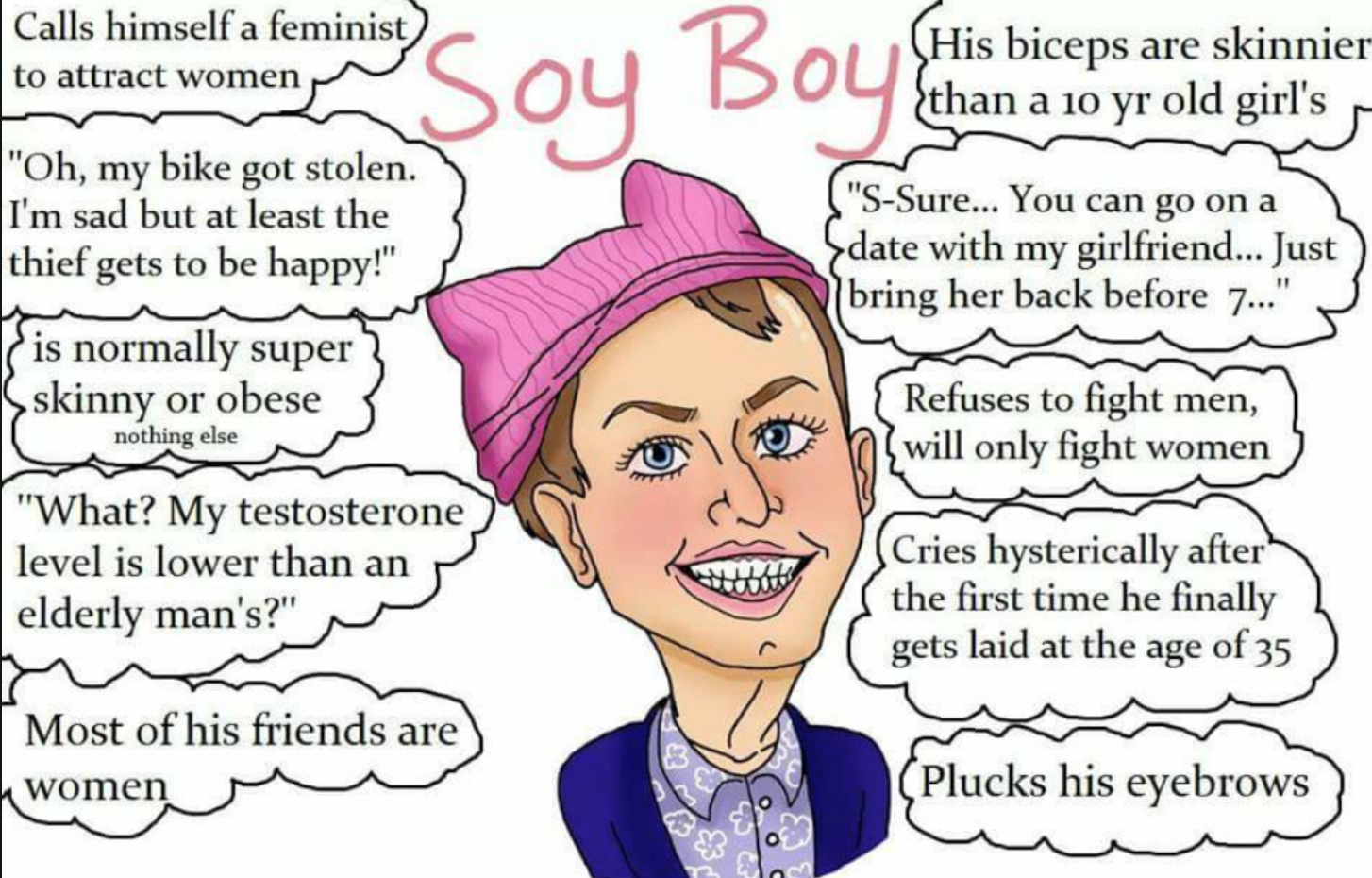
What do real men eat? Online culture wars and the science of soy boys
Cuck, beta, nu-male, pajama boy, and now soy boys. There’s no shortage of terms intended as insults to describe supposedly unmanly men nowadays. As the memes, tweets, videos and threads will tell you, there’s a suspicious lack of macho in these guys; they are simply not ‘manly’ enough.
Soy Boys
Somewhere in 2017, ‘soy boy’ was added to the list and became the latest insult of choice for the alt-right. As defined by the Urban Dictionary, it refers to:
“Slang used to describe males who completely and utterly lack all necessary masculine qualities. This pathetic state is usually achieved by an over-indulgence of emasculating products and/or ideologies.
The origin of the term derives from the negative effects soy consumption has been proven to have on the male physique and libido.
The average soy boy is a feminist, nonathletic, has never been in a fight, will probably marry the first girl that has sex with him, and likely reduces all his arguments to labeling the opposition as 'Nazis'."
One way to identify these supposedly unmanly men is the nu-male smile, also known as the soylent grin, soyboy face, nu-male face or cuckface.
numalesmile.png

https://knowyourmeme.com/memes/nu-male-smile
All kinds of men, from Justin Trudeau and Barack Obama to David Beckham and John Mayer, have been identified as soy boys in memes and online forums.
soyboymacron.png

https://esmemes.com/i/6398ffe6cfb64ccc8bed6230a678cfcf
The soy boy has been discussed in numerous articles (see e.g. Vice, Mic, MEL Magazine and The Independent), and the term has also found its way to outlets such as Russia Today, which some weeks ago titled an article about the consumption of substitutes for animal products with ‘Cowboy to soy boy: Americans consuming more fake meat & dairy than ever’. The comment section to the article is also interesting reading about American men supposedly being feminised; how it's all about the sterilisation of men by soy; about fake global warming guilt (because global warming is of course a hoax); and how the ability to eat red meat and drink cow milk is a ‘Nordic-Germanic’ ability (while ‘subhumans’ are lactose intolerant).
Real men drink cow milk and eat meat
And behold: to explain why these unmanly soy boys exist, science is often evoked, particularly that related to food and nutrition. Soy has estrogen in it, and estrogen makes men effeminate - so the argument goes. And that's bad of course, because who'd like to have traits associated with females?
Regardless of the fact that there's no scientific consensus or conclusive results on the effects of soy on health in general, low sperm counts and drops in testosterone are brought in as evidence of decline. Apocalyptic scenarios are suggested: Is soy feminising the west? Videos explaining why modern men are pussies, "backed by science", go from diluting genetics to castration of men in the west, to open borders and mass invasion of "violent rapey migrants" (yes, that escalated quickly). One of the most viewed videos on the topic is Paul Joseph Watson (of the conspiracy site InfoWars fame) presenting 'The Truth about Soy Boys'. From him we learn that “soy is the silent killer” of masculinity and that the world is “losing an entire generation of young men to soy.” This popular video also features Muslim refugees and rapey migrants.
The message is that real men don't consume soy or soy milk; they eat meat and drink cow milk. And somehow it's also about closing borders and rapey migrants, though in terms of argument you need to connect quite a few non-existing dots to get there. This kind of politics of food is now a visible topic in the media, from Reddit debate on the merits of scientific research on soy and estrogen to the talk show host Stephen Colbert making the point that “for white supremacists, lactose is their only form of tolerance”. The linking of genetics and racial supremacy (as in "white people are superior because they're able to digest lactose in milk as adults") by white supremacists has led even the American Society of Human Genetics to weigh in on the use of science to justify political views.
Memeing masculinity – the politics of real men
Subscribing to a definition of 'real' masculinity by some guy shouting conspiracy theories and pseudo-science on YouTube may seem like a weird choice. But many people do, and it's also easy to see the attraction of the memetic identity politics of dissing soy boys and beta males: it promises belonging, an identity based on strength and supremacy, and clarity and simplicity in what are for many chaotic times. The supposedly scientific, apocalyptic gender politics spelling the end of ‘western civilisation’ define easily understandable boxes for people to fit in and identify easy enemies.
There is a promising lure to the (alt-)right kind of masculinity promoted online. At the same time, debates about masculinity and gender in general are hardly about gender alone. They're also about ideas of nostalgic pasts when everything was supposedly better, as well as ideal futures when everything will be great again.
And for added credibility, there's of course the 'science' of estrogen and testosterone to back it all up. Speaking of science, climate scientists have just very recently given an explosive account of what the future looks like if we don’t change our ways. As it happens, they are recommending less reliance on exactly the kind of meat and dairy diet the soy-boy-hating crowd promotes as manly. And it's not only people studying culture who have realised that scientific issues such as climate change have become enmeshed in the so-called culture wars which the figure of the soy boy is also part of. Climate change denial, nutrition and health, white supremacy and anti-migration all come together in this memetic mix for normative masculinity.
Scientific knowledge has never been as accessible to people as it is now. But neither has the use of science for fear-mongering and intolerance (not of the lactose kind). The combination of 'just for fun' memes and 'facts', as in the case of the soy boy, is powerful in doing politics online. It's the 'just for fun' factor that causes many to dismiss memetic politics as irrelevant for study. But if we're to understand how people belong and construct communities of knowledge nowadays, it's this kind of online culture that we need to look into.
